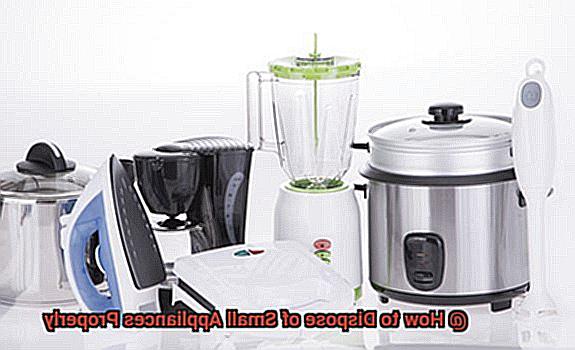Do you have a few small appliances taking up space in your home that you no longer use?
Perhaps it’s an old coffee maker that’s been replaced by a newer model, a broken blender collecting dust in the back of your cupboard, or a toaster that just doesn’t quite cut it anymore. It can be tempting to simply toss these items in the trash and forget about them, but did you know there are better ways to dispose of small appliances?
Not only is proper appliance disposal better for the environment, but it can also save you money. Many cities offer curbside collection programs for electronic waste, so you can often get rid of your old appliances for free.
Additionally, some retailers even offer incentives for recycling your old goods, such as discounts on new purchases. However, before you take advantage of these programs, there are important steps to follow to properly prepare your old appliances for disposal.
This may involve removing batteries or other hazardous materials, or disassembling your appliance to separate out recyclable components. In this blog post, we’ll provide all the information you need to dispose of your small appliances responsibly and with ease.
With our help, you can declutter your home without harming the environment – and maybe even save some money in the process.
What Are Small Appliances
Contents
Small appliances are the unsung heroes of our homes.
They make our lives easier and more convenient. From brewing our morning coffee to styling our hair, these devices provide us with the modern-day luxuries we’ve come to rely on.
However, when it comes to disposing of these little wonders, it’s essential to do so responsibly to avoid negative impacts on the environment. To better understand what qualifies as a small appliance, let’s break it down.
Small appliances are any electrical or battery-operated devices designed for household use that are generally portable. You can think of toasters, coffee makers, blenders, electric shavers, and hair dryers – anything that can fit comfortably on your kitchen counter or bathroom shelf.
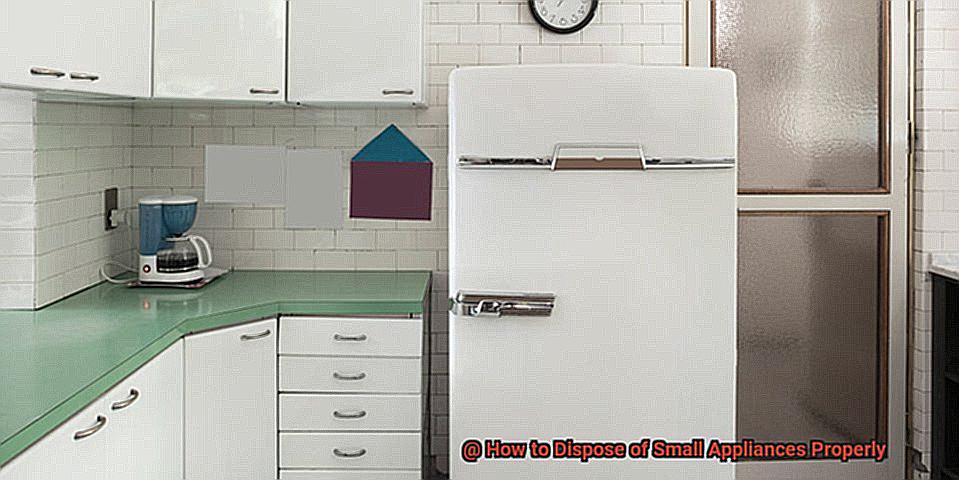
But small appliances may be small in size, but they can still pack a punch when it comes to harmful materials. Many of these gadgets contain hazardous materials such as lead, mercury, and cadmium that can be harmful if not disposed of correctly.
It is important to recognize the potential hazards associated with small appliances and take steps to responsibly dispose of them. Here are some tips to help you dispose of your small appliances responsibly:
Check with your local municipality: Before throwing away any small appliance, check with your local municipality to see if they have specific guidelines or regulations in place for proper disposal.
Donate it
If your small appliance is still in good working condition, consider donating it to a local charity or thrift store.
This way, someone else can make use of it, and it won’t end up in a landfill. 3.
Recycle it
Many small appliances can be recycled. It’s important to check with your local recycling center to see if they accept small appliances and what their guidelines are for preparing them for recycling.
Take it to a hazardous waste collection event: If your small appliance contains hazardous materials, such as a rechargeable battery or a light bulb containing mercury, take it to a hazardous waste collection event.
By following these tips, you can ensure that your small appliances are disposed of properly and responsibly. Proper disposal not only protects the environment but also helps conserve valuable resources by allowing materials to be reused or recycled.
By understanding what qualifies as a small appliance and taking steps to dispose of them correctly, we can help protect our planet and ensure a sustainable future.
Reasons for Proper Disposal of Small Appliances
First and foremost, proper disposal of small appliances helps to protect our environment.
These small gadgets often contain hazardous materials like mercury that can pollute soil and water sources if not disposed of responsibly. Can you imagine a world where we cannot rely on our water sources or soil for sustenance due to improper disposal of electronic waste?
By disposing of small appliances properly, we can reduce the amount of hazardous waste that ends up in landfills or incinerators. Secondly, proper disposal of small appliances also plays a significant role in conserving natural resources.
These appliances contain valuable materials such as copper, aluminum, and other metals that can be recycled and reused. By recycling these materials, we can reduce the need for new raw materials to be extracted from the earth, which helps to conserve natural resources.
It’s a simple way to reduce deforestation and other environmental degradation. Lastly, proper disposal of small appliances can help prevent identity theft.
Many small appliances such as computers and smartphones contain personal information that needs to be erased before they are discarded. If this information is not erased correctly, it can fall into the wrong hands and be used for identity theft or other malicious purposes.
By disposing of small appliances properly, we can ensure our personal information remains secure.
So, proper disposal of small appliances is essential for protecting the environment, conserving natural resources, and preventing identity theft.
Check with Your Local Municipality
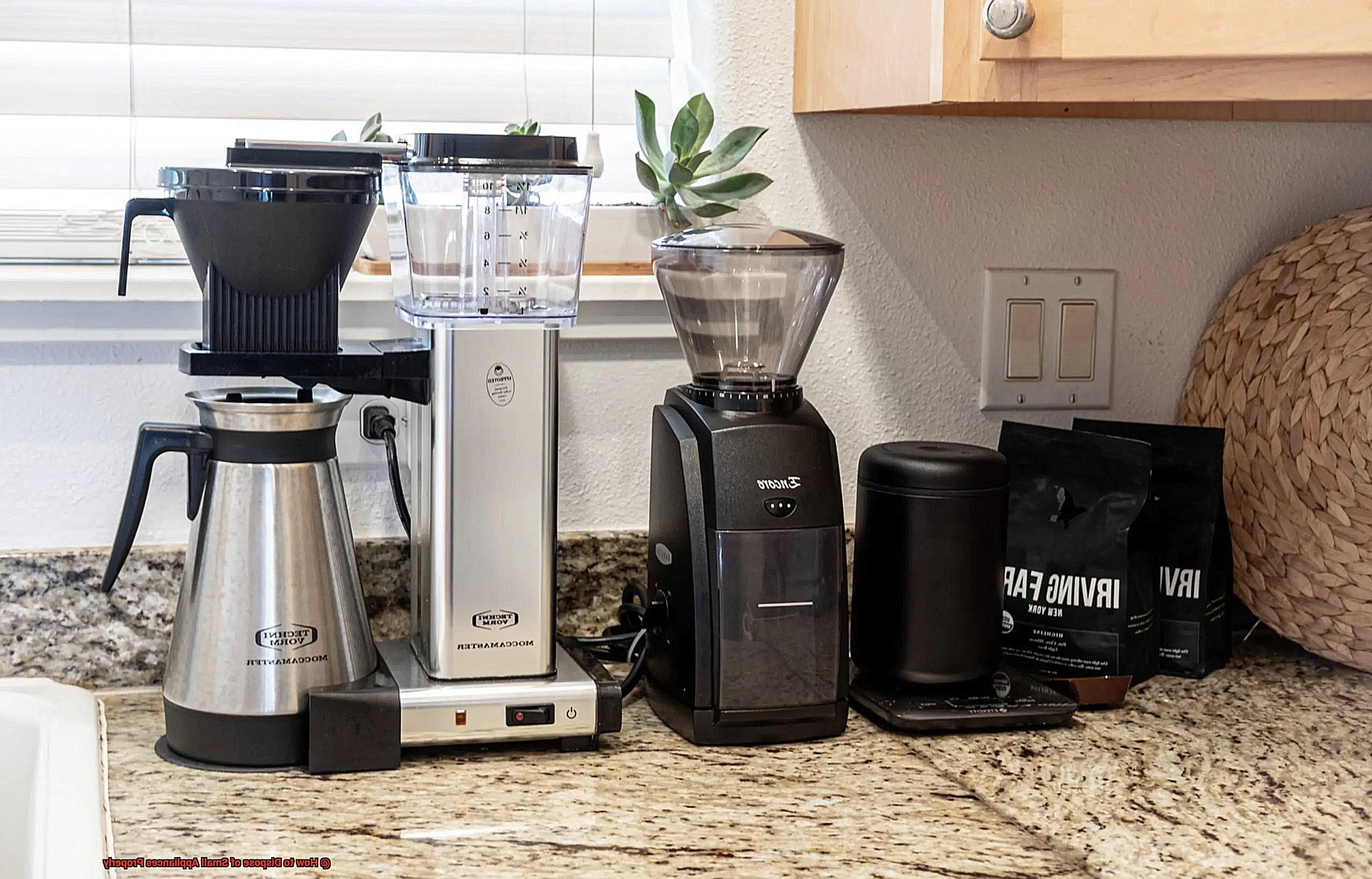
In the previous section, we learned about the importance of recycling small appliances to preserve our planet and prevent identity theft.
But, did you know that before disposing of them, you must check with your local municipality first? Think of it like having a team of sidekicks to assist you in your mission to save the world.
Just like how Robin helps Batman, our local government is here to help us dispose of electronic waste responsibly. You see, many cities and towns have specific policies in place for how to properly dispose of small appliances.
The first option available to us is taking our small appliances to a designated electronic waste recycling center. These facilities are like the Avengers Tower for small appliances – they’re equipped to handle the proper disposal of electronic devices.
Some municipalities may even offer curbside pickup for electronic waste, but it’s best to double-check with your local government to see if this service is available in your area. It’s essential to note that some small appliances may contain harmful materials that need to be disposed of properly.
Just like how Iron Man has his suit, some refrigerators and air conditioners contain refrigerants that can harm the environment if not disposed of correctly. Your local municipality may have established specific guidelines for the disposal of these types of appliances.
Another superhero team you can reach out to is the manufacturers or retailers of your small appliances. Many companies have programs in place for recycling or disposing of their products in an environmentally friendly manner.
Donate It
Not only does it benefit those in need, but it also helps keep our planet green by reducing waste in landfills.
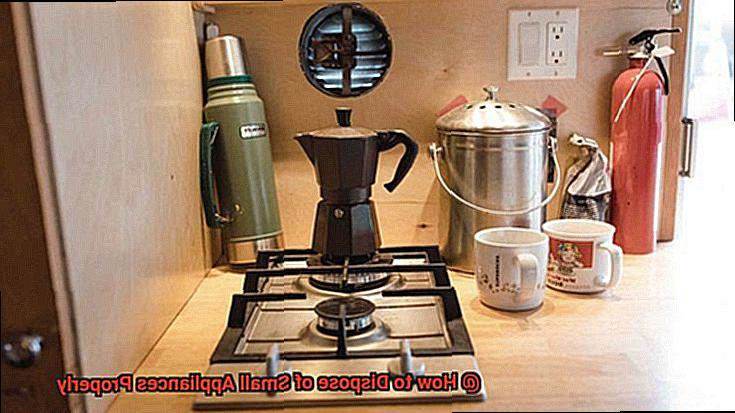
To donate your small appliances, you can choose from several options. One easy way is to give them to a local charity or thrift store like Goodwill, The Salvation Army, or Habitat for Humanity.
These organizations accept gently used appliances and sell them at a low cost to those who cannot afford new ones. If you want to make an even bigger impact, consider donating to nonprofit organizations that focus specifically on providing appliances to families in need.
Appliances Connection’s Helping Hands Foundation and Community Warehouse are excellent examples of such organizations. Before donating your appliance, ensure that it is still in good working condition.
If it needs repairs, consider fixing it before donating or informing the organization so they can repair it themselves. It is essential to research the donation policies and procedures of the organization you plan to donate to.
Some may require an appointment for drop-off or offer pick-up services, while others may only accept specific types of appliances or have guidelines for donations.
By donating your small appliances, you not only help those in need but also positively impact the environment.
Recycle It
Recycling your small appliances is not only an environmentally responsible choice, but it also helps conserve natural resources.
By breaking down the appliance into individual components, materials can be reused instead of ending up in a landfill. Before you pack up your appliance for recycling, it’s important to check with your local recycling center to see what types of appliances they accept.
Not all centers accept all types of appliances, so it’s important to do your research beforehand. Think of it like browsing a restaurant menu before you go – you wouldn’t want to show up and find out they don’t have your favorite dish, right?
If your small appliance is still in working condition, consider donating it to a local charity or non-profit organization instead of recycling it. This way, someone in need can benefit from its use and you’ll be reducing waste at the same time.
When preparing your appliance for recycling, make sure to remove any batteries or other hazardous materials before taking it to the recycling center. This will help ensure that the recycling process is as safe as possible for workers.
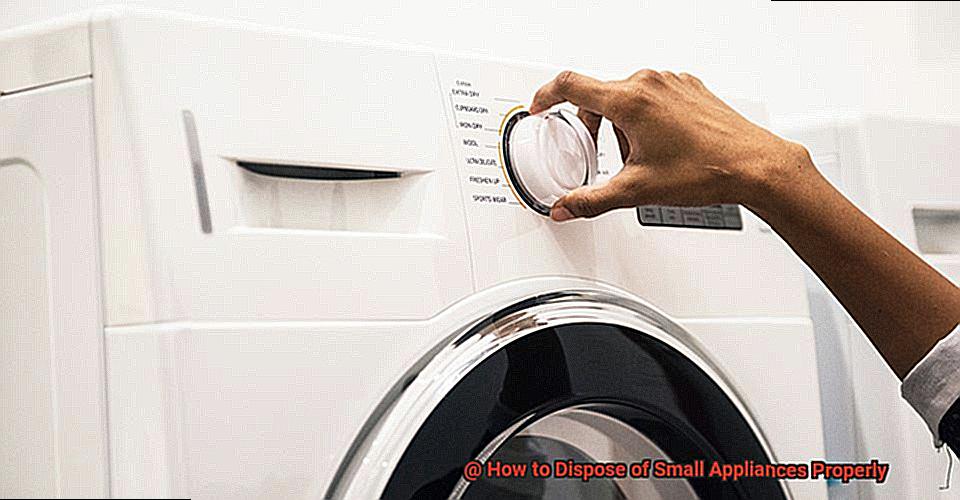
Remember, small actions can make a big impact – so next time you’re ready to say goodbye to a small appliance, think about recycling or donating instead of throwing it away.
Take it to a Hazardous Waste Collection Event
A hazardous waste collection event is the perfect solution. Think of this event as a gathering of environmentally-conscious individuals who want to give harmful items a proper farewell.
Hazardous waste collection events are organized by local governments or waste management companies with the goal of safely disposing of hazardous items, including small appliances that contain materials like lead, mercury, or cadmium.
It’s essential to properly dispose of these small appliances to protect our planet from harmful chemicals and ensure the safety of those handling them during the disposal process.
Not all small appliances can be accepted at these events, so be sure to check with your local government or waste management company first. When you arrive at the event, organizers will provide instructions on how to transport your items safely and where to drop them off.
It’s important to follow these instructions carefully to ensure the success of the event and the safety of everyone involved. By participating in a hazardous waste collection event, you’re not only doing your part for the environment but also protecting the health and well-being of your community.
You’ll be giving your small appliances a second chance at life while making a positive impact on our planet.
Other Options for Disposing of Small Appliances
Instead of adding to the growing pile of waste in landfills, consider other responsible and sustainable options for disposing of them.
One choice is to donate your appliances to a local charity or thrift store. Not only will you be helping out your community, but you’ll also be extending the life of your appliance by giving it a second chance.
It’s a win-win situation that benefits everyone involved. Another option is to recycle your appliance.
Many cities and towns have recycling programs that accept small appliances at electronics recycling centers or household hazardous waste facilities. This ensures that your item is disposed of properly while also allowing any reusable materials to be recycled.
If you’re unsure where to go, consider checking with retailers like Best Buy, who offer free recycling programs for small appliances. But don’t stop there.
Have you thought about repurposing your appliance? Even if it no longer serves its original purpose, it may still have some use in another form.
An old blender could become a unique planter or a lamp base, for example. Let your creativity run wild and breathe new life into something old.
2hmNWCtS97U” >
Conclusion
In conclusion, properly disposing of small appliances is crucial to safeguarding our environment and conserving natural resources.
These appliances often contain hazardous materials that can harm the environment if not disposed of correctly. Therefore, it’s essential to follow proper disposal methods to ensure these materials are recycled or disposed of safely.
Fortunately, there are several options available for disposing of small appliances responsibly. You can check with your local municipality for electronic waste recycling centers or curbside pickup programs, donate them to a local charity or thrift store, recycle them at a recycling center, or even repurpose them creatively.
By taking these simple steps and making responsible choices, we can all do our part in protecting the environment and promoting sustainable waste management practices.
